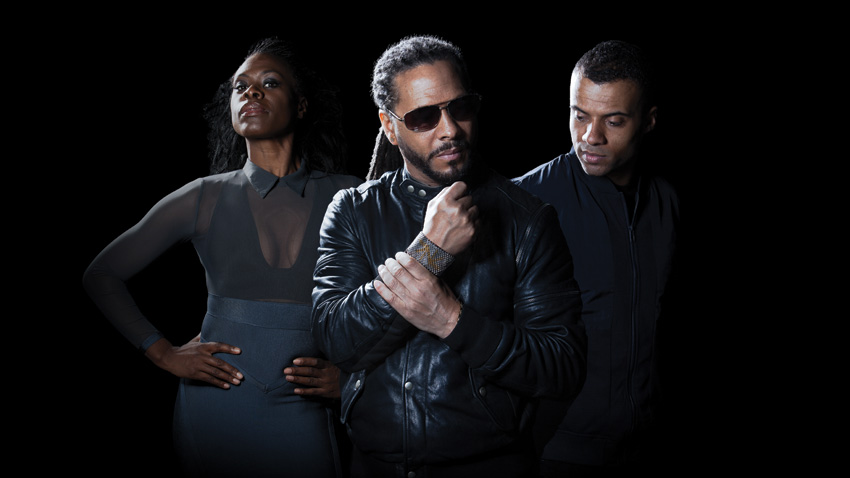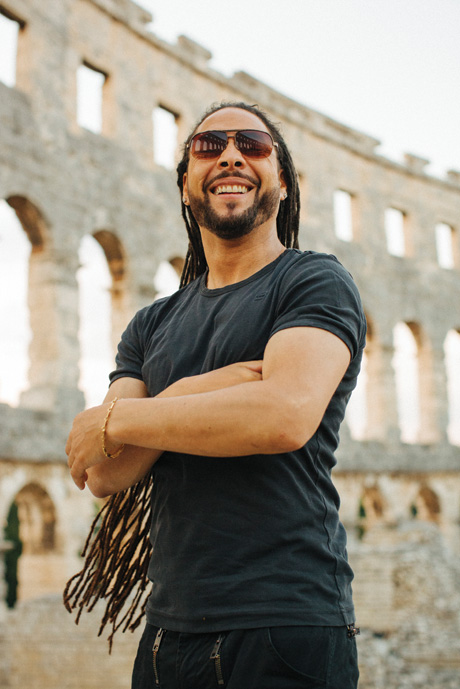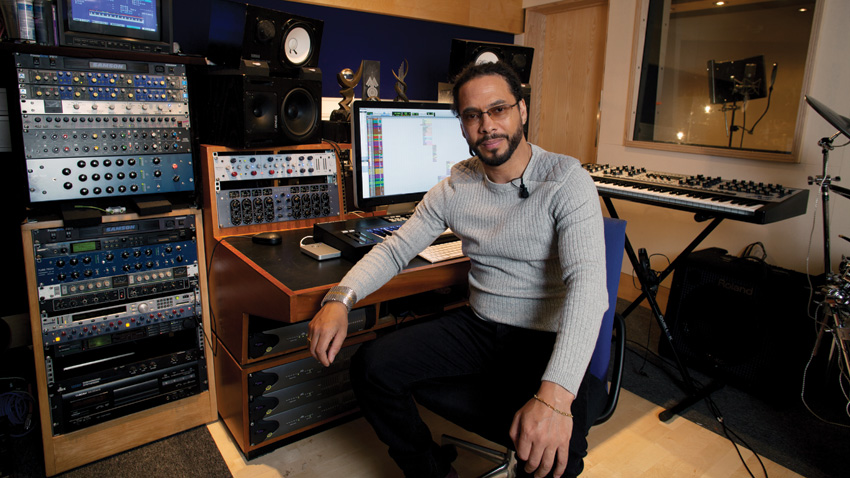Roni Size on the continuing success of Reprazent, live and in the studio
Almost 20 years after he and Reprazent won the Mercury Music Prize with New Forms, Roni Size is still pushing drum 'n' bass into the future

"I've done a lot of interviews over the last 20-odd years and so many of them have been about my life, my family, personal stuff… things I don't really like talking about in public. What gets me excited is talking about the music. Sharing the knowledge; passing it on to the next generation."
Roni Size - DJ, producer, drum 'n' bass pioneer and Mercury Prize winner with the groundbreaking New Forms album - is in Bristol (where else?) preparing for a busy summer of live shows and releases. But he's always happy to take a break for an hour or two and talk about… music.
Foremost in his mind at the moment is Full Cycle Records, the label he co-founded in 1994, which was resurrected earlier this year. Alongside product from the likes of Swindle, Size and DJ Krust - including an update of the latter two artists' 1993 track Formulate - there's also talk of a new Reprazent album.
"Reprazent did some live shows last year and it felt so good to be back up there on stage," explains Size. "Technology has moved on a lot since we put out the first album in 1997, and we've sorted out this incredible light show - great visuals. But the band is still a real band; 90% live musicians.
"We were hoping to get a new album out this year, but I think it's probably going to be 2017. Although the music's there and the songs are already written, we just want to make sure everything is in place before we throw it into the big wide world."
It's no surprise that we're talking to you in Bristol. How much has the city influenced you and your music?
"Unfortunately, I don't have a direct line to God, so there was no way I could talk to him while I was in my mother's womb and say, 'Please let me be born in Bristol'. All I know is that the sound of this city and my family have made me who I am.
Want all the hottest music and gear news, reviews, deals, features and more, direct to your inbox? Sign up here.
"I was surrounded by music. We had the St Pauls Carnival (little brother to Notting Hill); we had blues parties; we had sound systems. I had brothers who were listening to reggae, hip-hop and soul. It was an urban cocktail before anyone had even thought of the name 'urban'.
"But what was also important - and this will make perfect sense to anyone who reads a magazine like Computer Music - was that I grew up in the age of the ZX Spectrum, the BBC Micro, the VIC-20 and the Commodore 64. There's a road in Bristol, Gloucester Road, and that's where all the music shops used to be. It was also where I came across my first computer shop. A shop… just for computers!
"The two shops were literally next door to each other, which, to my young mind, made perfect sense. Two different streams of technology, linked together. In one, you had drum machines and synthesisers; in the other, you had computers.
"Every day, after school, I used to walk down Gloucester Road, going from the music shop to the computer shop and back to the music shop. Man, I was in heaven!"
Were you a musical kid?
"[Laughs] In my head, I was musical. I remember, one of the teachers asked me what I wanted to do when I left school, and I said, 'I'm gonna do beatboxing'. This teacher asked me if I was interested in music and started talking about quavers and chords, and I thought, 'Nah, man… that's not music'.
"Looking back, I wish I'd have listened and I wish I'd learned a bit more about music theory, but to me, music meant Gloucester Road and a movie called Wild Style [1983]. Seeing that film made me realise what I wanted to do with my life. In the movie, they had turntables, but we had tape decks and we had little computers that made these beeping sounds. That was the start of my journey.
"I didn't have the money to own any of this shit myself, so I started hanging around with kids who could afford a tape deck, an Alesis drum machine or a Commodore 64. After a while, I realised I was always the first one to turn up at that kid's house and the last one to leave. One by one, all the other kids got bored and went off to play football or ride their bikes, but I was fascinated by music technology.
"Can I make one final point about this era? Music technology, computer music, urban music - call it what you want - hadn't been done in the UK before. The horizon was as wide as you wanted it to be; the future was yours to mould in whatever way you wanted. It felt like anything was possible."
"One of the teachers asked me what I wanted to do when I left school, and I said, 'I'm gonna do beatboxing.'"
When did you finally get hold of your first bits of kit?
"My brother jumped in way before me. He got an Atari, an S950, a Studiomaster desk… these days it seems very basic, but to us, it was an Aladdin's cave of sound. Equipment was so expensive and so rare that you felt like a king if you owned just one synthesiser. And that willingness to work with whatever was at hand was a great lesson because it made you hungry and it stretched your imagination. If I looked through my mum's record collection and found some long-forgotten soul album, I'd listen to it and pull out ten different samples that I could put to good use.
"I think my first setup was an Atari, Notator, a 707 drum machine and a Kawai K1 module. Simple, but effective. And I was so naïve that I just thought I was going to make the greatest records the world had ever heard.
"My sound was… well, I guess you'd call it digital reggae. I was listening to hip-hop and reggae and, like so many British kids at the time, I was trying to make it mine. I didn't want it to be from another country; I wanted it to be from the UK, from Bristol.
"I would argue that it was the search for our own sound that eventually led the UK to jungle. The speeded-up breaks gave it a sort of punky attitude, you had samples from hip-hop, the sub-bass from reggae and a dash of rude boy. When I found that, I felt like I was finally coming home. I had my girl, a bit of weed and, at last, I had my music."

You've told the story of the first Reprazent album many times; we don't want to cover that again, but we thought it would be interesting to talk about that first decade or so of jungle/drum 'n' bass. It swaggered out of the underground, went overground, went underground again, then back overground again. Then, after the success of your album, it sort of sneaked back out of the spotlight. Hardly a week went by without some critic heralding the death of drum 'n' bass…
"And here we are, almost 20 years later, and drum 'n' bass is bigger than it's ever been. You turn on any radio or TV and you will hear drum 'n' bass. It's part of the fabric of everyday life.
"One of the problems was that DnB started to splinter into so many different genres that people found it hard to keep up; it sort of lost its identity. But that's how music works. It comes, it goes, it grows, it brings in a new generation of fans… but as long as it's got its own unique sound and style, it will always be there.
"Where will it go from here? That's an easy question to answer. You've got kids making music today who were still in short trousers when New Forms came out. I hope that the likes of us and Goldie and Krust and all those guys have been a small part of their musical education, but those kids have also grown up surrounded by British urban music. Grime, garage, dubstep… that is our sound.
"Drum 'n' bass will take all those sounds and it will travel somewhere new. Occasionally, it will over-complicate itself - and I think the spread of technology has a big part to play in that - but it will always find its way back to the simple path. The best songs aren't complicated; they're straightforward and simple."
It sounds like Reprazent is still active and still a 'live' experience…
RS: "Absolutely!"
What made you want to take it live in those early days? Wouldn't it have been easier to tour with a couple of ADATs, a sequencer, a sampler and a turntable? Were you trying to make Reprazent sound… different?
"Not at all. We never sat around in the studio and said, 'Let's do this so we don't sound like so-and-so'. The reason we took it live is because we could. After we got signed to Talkin' Loud, we had the cash and clout of a major record company behind us. We had the opportunity to turn Reprazent into a proper live band that stood on stage and played their instruments. That excited me because… well, everybody wants to be in a band.
"Sure, we could have gone halfway. We could have had some backing singers, maybe a bass player and some keyboards, but we wanted the real deal. Maybe in those situations, ignorance is bliss. We had no idea how difficult it was going to be to find the right combination of musicians, how much it would cost or even if it would work. But we'd seen The Prodigy do it live and we just jumped right in.
"There was a period, a few years back, where I think we took it too far. Bit by bit, we kept stripping away the machines and the computers, but there was a point where we started to sound like a jazz band. Not that I've got anything against jazz, but that wasn't what we were about. I think I've now realised that you have to always track elements of the drums and bass because that's where you get the power.
"Turning Reprazent into a live experience certainly helped spread the word about the album. And in turn, the album won the Mercury Prize, which was the best thing that could ever have happened to us or to drum 'n' bass. People started to take it seriously."
For a while, it seemed like the future of drum 'n' bass had been placed in your hands. We'd think that would put you and the band under some pressure.
"Pressure? Are you kidding? Pressure is living in a one-bedroom flat in St Pauls with no job, no money, no food to feed your kids, no prospects and no future. That's pressure! Winning music awards isn't pressure. It's fun - it's what a band is supposed to do if it's doing its job properly."
Although you started out with hardware and Atari, you were something of an early convert to Pro Tools.
"Yeah, it must have been '98 or '99 - not long after we released New Forms. We were working in a studio somewhere and they had this huge SSL desk with a Pro Tools rig. I just looked at it and thought, 'That is the biggest, most powerful sampler I have ever seen'.
"We were quids-in at the time, and a lot of the manufacturers were keen to offer us knock-down prices, so we suddenly found ourselves with a mammoth SSL desk and Pro Tools. We didn't touch the MIDI side of things; all we were interested in was audio. Being able to get all our samples and our hardware onto that computer.
"Anyone who can remember the sampler days will tell you how long it took to render a bit of audio back then. You could set it going, make a cup of tea, have a smoke, make a couple of phone calls and it still wouldn't be finished. Someone showed me how it worked on Pro Tools and, whoa, it took seconds. Timestretching, chopping up loops… I could see a million doors opening up in front of me.
"Having said that, it was a seriously steep learning curve for me. Up until then, we'd used fairly simple desks. If you wanted more bass, you turned it up; if you wanted less bass, you turned it down. I looked at the SSL and I was bombarded with all these numbers. What does 40 mean? If I turn it to 40, what happens? What does 2K mean? What's a K?
"The next ten years were my education. I'm not saying I'm 'that guy'; I'm not one of those producers who can answer every technical question that's thrown at him, but I know my way around the studio. I can get the job done. I understand that, alongside the 'art' of making music, there's a 'science', too."

We know you're still with Pro Tools, but have you tried Ableton, Logic at al
"Tried them all and could probably turn out a track on all of them. Once you've got your quick keys in place, a good producer ought to be able to work on whatever he's presented with. Otherwise, you get stuck with that old argument: I can't do this production unless I've got this synth and this compressor and this platform and so on. Music is not - and never will be - about the equipment. If you've got something that makes a noise, you should be able to make music. I remember when we first got Pro Tools, people kept saying, 'Man, you're gonna have problems getting all the third-party VSTs to work with that'. But Pro Tools had more than enough onboard stuff to keep us busy.
"I'll admit that, yes, these days, the computer is full to the brim with plugins, VSTs, gadgets and crazy gear. UAD? I've got almost everything they've put out. My latest toy is the Envolution, a wicked transient shaper. All my drums get put onto three buses, and each one goes through the SSL, a Fairchild compressor and the Envolution. They sound pretty good after the SSL and the Fairchild, but that transient designer just gives everything a whole new shape. It tightens up the sound and makes it feel like a completely different groove."
And if we took all those toys away..?
"I could still give you a killer tune, even if I was back working with the Kawai and the 707. Don't get into a situation where all your hopes and dreams are relying on what equipment you've got. Those hopes and dreams should only be relying on one thing: you!"
Roni Size and DJ Krust's Formulate is out now on Full Cycle, where you can also find out more about the 2016 tour.


Computer Music magazine is the world’s best selling publication dedicated solely to making great music with your Mac or PC computer. Each issue it brings its lucky readers the best in cutting-edge tutorials, need-to-know, expert software reviews and even all the tools you actually need to make great music today, courtesy of our legendary CM Plugin Suite.
